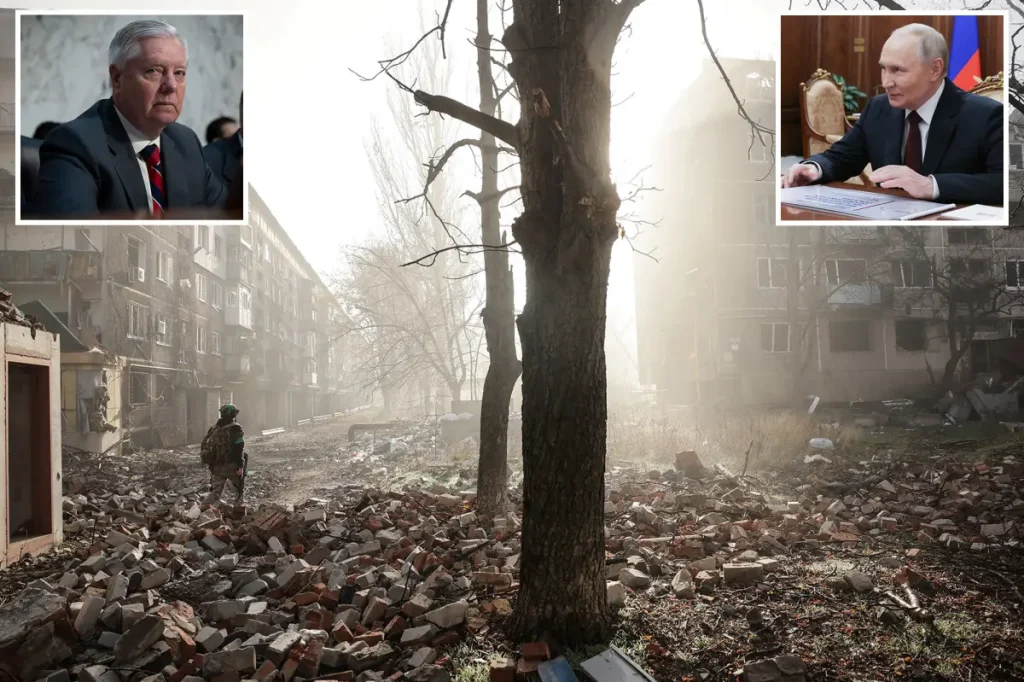Congress to Vote on Russia Sanctions Bill With Trump’s Support
Sen. Lindsey Graham of South Carolina announced on Monday that Congress is preparing to vote on new economic sanctions targeting Russia. This bipartisan legislation aims to provide President Trump with additional leverage to address the ongoing conflict in Ukraine. According to Graham’s statement on social media platform X, the bill has received President Trump’s blessing and will move forward with strong support from both political parties. The Republican senator expressed his satisfaction with this development, framing the sanctions as necessary tools to help end what he described as a “bloodbath in Ukraine.”
The proposed legislation would expand the U.S. government’s options for pressuring Russia by enabling the President to impose secondary sanctions. These secondary sanctions would likely target entities and individuals doing business with Russia, creating a wider economic impact beyond direct U.S.-Russia relations. Graham’s announcement represents a significant moment in American policy toward the Russia-Ukraine conflict, suggesting continued U.S. involvement and support for Ukraine despite speculation about potential shifts in foreign policy direction. The timing of this bill follows ongoing international concerns about the humanitarian situation in Ukraine and the broader geopolitical implications of the conflict.
This sanctions package appears to have unusual bipartisan backing in an otherwise polarized Congress, highlighting how Russia policy continues to bridge partisan divides in American politics. The specific mechanisms and targets of these sanctions have not been fully detailed in Graham’s announcement, but they would presumably build upon existing economic restrictions placed on Russia since the beginning of the Ukraine conflict. By describing the legislation as providing “more tools” for the President, Graham suggests that these sanctions would complement rather than replace current diplomatic and economic measures being employed to influence Russian behavior.
President Trump’s reported support for the sanctions bill marks an interesting development, as questions have surrounded his administration’s approach to Russia and Ukraine policy. Graham’s framing of the legislation as having received the President’s “blessing” indicates coordination between Congress and the White House on this issue. The senator’s post suggests that the administration sees economic pressure as an essential component of its strategy for resolving the Ukraine conflict, rather than relying solely on direct negotiations or military support to Ukraine. This suggests continuity in at least some aspects of U.S. foreign policy regarding Russia despite broader debates about America’s global role.
If passed, these sanctions would represent another escalation in economic measures against Russia and potentially affect its international trading relationships. Secondary sanctions in particular have the potential to isolate Russia further from global markets by forcing international companies and financial institutions to choose between doing business with Russia or maintaining access to the U.S. financial system. The reference to ending the “bloodbath in Ukraine” demonstrates how U.S. lawmakers are positioning these economic measures as having humanitarian motivations, not merely geopolitical ones. This framing helps build broader support for what might otherwise be seen as purely political maneuvers.
Graham’s announcement leaves several questions unanswered about the specific provisions of the legislation, the timeline for its consideration, and the exact nature of the secondary sanctions being proposed. It also remains to be seen how Russia might respond to these additional economic pressures, and whether they would have the desired effect of changing Russian policy toward Ukraine. Nevertheless, the bipartisan nature of the bill suggests it has a strong chance of passage, potentially giving the administration expanded options for addressing one of the most challenging international conflicts of recent years. As this legislation moves through Congress, it will likely spark renewed debate about the effectiveness of sanctions as a foreign policy tool and America’s proper role in European security matters.


